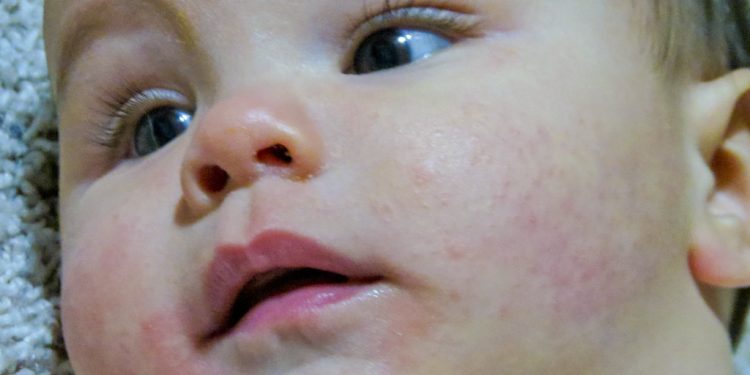Babies have delicate, sensitive skin that requires extra care and attention. For some infants, skin conditions like eczema can be particularly challenging, causing discomfort, dryness, and itchiness. Eczema, also known as atopic dermatitis, is one of the most common skin issues affecting babies, and it often leads to red, irritated patches on the skin. Managing eczema and other skin conditions can feel overwhelming, but with the right strategies, parents can help alleviate their baby’s symptoms and keep their skin healthy. This essay will provide practical tips for managing baby eczema, discuss common skin triggers, and offer advice on creating a soothing skincare routine.
Understanding Baby Eczema
Eczema is a chronic skin condition that causes inflammation, itching, and redness. It typically appears in infants between the ages of two and six months and can continue into childhood. Eczema can vary in severity, with some babies experiencing occasional flare-ups while others deal with persistent symptoms. The condition is often linked to a combination of genetic and environmental factors, and babies with a family history of allergies, asthma, or eczema are more likely to develop it.
The skin of babies with eczema has a weakened barrier, making it more prone to dryness and irritation. This means that their skin may lose moisture more easily, allowing irritants and allergens to penetrate, which can trigger inflammation. While there is no cure for eczema, it can be managed effectively with consistent care and by avoiding triggers that may cause flare-ups.
Identifying Common Triggers
Managing baby eczema starts with identifying and minimizing exposure to potential triggers. Each baby may have different triggers, but there are some common factors that can contribute to flare-ups:
- Dry Skin: Dry skin is a common trigger for eczema flare-ups. Cold weather, low humidity, and frequent bathing without proper moisturizing can lead to dry, irritated skin. Keeping your baby’s skin well-hydrated is crucial for managing eczema.
- Irritants: Certain products, such as soaps, shampoos, detergents, and even fabrics, can irritate a baby’s sensitive skin. Fragrances, dyes, and harsh chemicals are common irritants that should be avoided. Opt for gentle, fragrance-free products that are specifically formulated for sensitive skin.
- Heat and Sweat: Heat and sweating can exacerbate eczema symptoms. Overdressing your baby or exposing them to hot, humid conditions can lead to increased sweating, which can trigger itching and irritation.
- Allergens: Environmental allergens, such as dust mites, pollen, pet dander, and mold, can trigger eczema in some babies. While it may not be possible to eliminate all allergens, keeping your home clean and minimizing exposure can help reduce flare-ups.
- Food Allergies: In some cases, certain foods may contribute to eczema flare-ups. Common culprits include dairy, eggs, soy, and wheat. If you suspect that a particular food is aggravating your baby’s eczema, consult your pediatrician or an allergist for guidance.
Establishing a Soothing Skincare Routine
Creating a consistent and soothing skincare routine is essential for managing baby eczema. Here are some practical steps parents can take to keep their baby’s skin healthy and reduce the frequency of flare-ups:
- Moisturize Regularly: Moisturizing is one of the most important steps in managing eczema. Apply a gentle, fragrance-free moisturizer to your baby’s skin at least twice a day, especially after baths, to lock in moisture. Thicker creams or ointments are often more effective than lotions, as they provide a stronger barrier against moisture loss.
- Use Lukewarm Water for Baths: Bathing your baby in lukewarm water, rather than hot water, helps prevent dryness. Keep baths short—no more than 10 minutes—and use a gentle, soap-free cleanser. Avoid bubble baths, as they can strip the skin of natural oils.
- Pat Dry and Moisturize Immediately: After bathing, gently pat your baby’s skin dry with a soft towel, being careful not to rub or irritate the skin. Apply moisturizer immediately after drying to help seal in moisture while the skin is still slightly damp.
- Dress in Soft, Breathable Fabrics: Choose clothing made from soft, breathable fabrics like cotton to minimize irritation. Avoid wool or synthetic materials that can be rough on the skin. Dressing your baby in layers can help regulate their body temperature and prevent overheating, which can trigger eczema.
- Use a Humidifier: If you live in a dry climate or use indoor heating during the winter, consider using a humidifier in your baby’s room. Adding moisture to the air can help prevent your baby’s skin from becoming too dry and reduce the risk of eczema flare-ups.
Managing Itching and Discomfort
One of the most challenging aspects of eczema is managing the itching and discomfort that often accompanies flare-ups. Babies cannot resist the urge to scratch, which can lead to broken skin and an increased risk of infection. Here are some tips to help manage itching and keep your baby comfortable:
- Keep Nails Short: Keeping your baby’s nails trimmed short can help minimize damage if they do scratch. You can also use soft mittens to prevent scratching, especially during sleep.
- Apply Cool Compresses: If your baby seems particularly itchy, applying a cool, damp cloth to the affected area can provide relief. Avoid using ice packs, as they can be too harsh for a baby’s sensitive skin.
- Use Anti-Itch Creams as Directed: In some cases, your pediatrician may recommend an over-the-counter or prescription anti-itch cream to help manage severe itching. Always follow your doctor’s instructions when using these products, as some creams may not be suitable for infants.
When to See a Doctor
While most cases of baby eczema can be managed at home with proper skincare, there are times when it is important to seek medical advice. If your baby’s eczema is severe, persistent, or appears to be infected (signs include oozing, crusting, or yellowish skin), consult your pediatrician. They may recommend prescription treatments, such as topical steroids or antibiotics, to help manage the condition and prevent complications.
Your doctor may also refer you to a dermatologist or allergist for further evaluation if your baby’s eczema does not respond to standard treatments or if there is a concern about underlying allergies.
Emotional Support for Parents
Managing a chronic condition like eczema can be emotionally challenging for parents. It can be difficult to see your baby in discomfort, and the constant need for skincare can be exhausting. It’s important to remember that you are not alone—many families face similar challenges, and support is available.
Consider joining a support group for parents of children with eczema, where you can share experiences, exchange tips, and find comfort in knowing that others understand what you are going through. Remember that eczema is a manageable condition, and with time and patience, you will find the strategies that work best for your baby.













